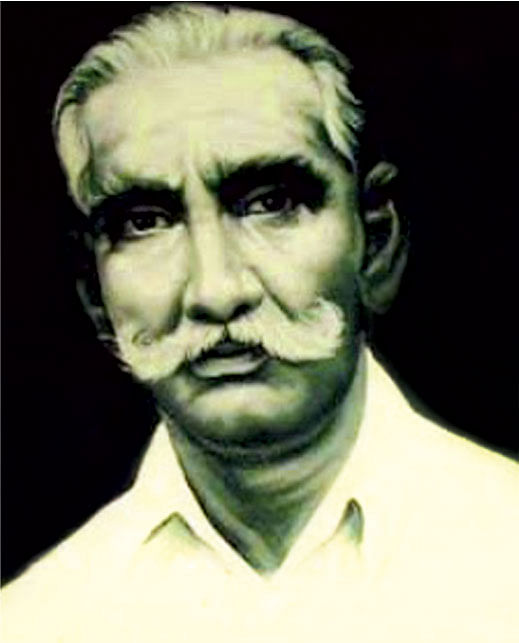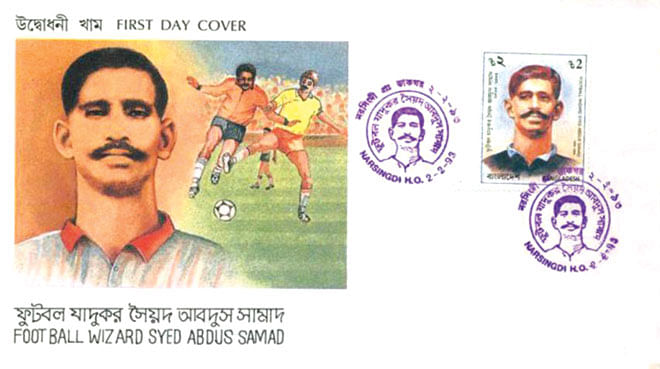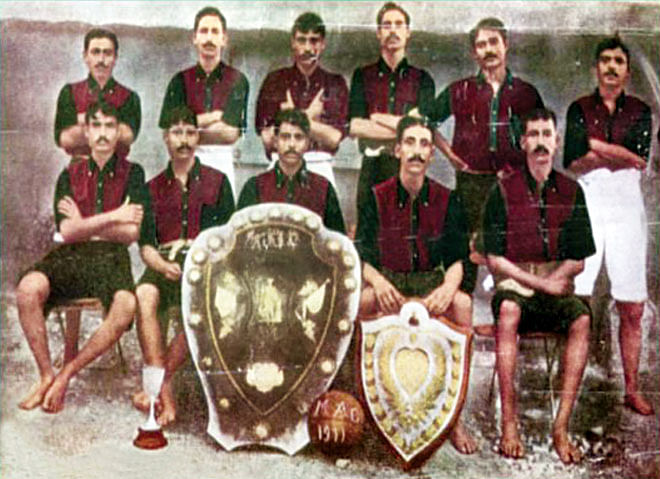The Unsung Hero
The Unsung Hero
The story of a forgotten football star of our own

It was like the scene of a typical football match recently played by Brazil. Within less than half an hour Chinese players devastated the Indian football team with three goals. The helpless Indian defenders could do nothing to prevent the fast and furious Chinese strikers. In the dug- out, six feet tall man with a stout physique was seeing how his team was being demolished. He was in the Indian team but could not join the match because of an injury.
Seeing his team's helpless condition, he requested the coach to take him into the field. He promised the coach that within 15 minutes he would make four goals and win the match. The coach kept his request. To everyone's astonishment that man with his amazing dribbling and invincible speed made the first goal in just three minutes of coming into the field. Within five minutes he again kicked the ball from the midfield straight to the opponent's net. By that time the Chinese players sensed real danger. They took strong defence to tackle this superhuman. But it was in vain, the magician of a footballer kept his words and made India victorious by 4-3 goals.
No, this is not a fantasy match where Messi or Neymar played for the team India. This is a real match and the superhuman player was one of our own. Footballer Syed Abdus Samad, was the hero of many such football legends. More than half a century ago this player made football fans around the world quiver with excitement. A Scottish football expert, seeing Samad's amazing performance in the match says, “If Samad was a European he would be recognized as one of the best football players of the world.”
Syed Abdus Samad was born in 1895 in Bihar of British India. At that time very few Indians got the chance to play this game of colonial lords. But Samad showed his extraordinary talent in football in his early years. While playing for the Purnea Junior Football club his amazing dribbling and measured shot drew attention of the club managers of Calcutta. In 1912, he joined the Calcutta Main Town Club, at the age of 15 only. At that time he left school while in the eighth grade and made football his only concern. From 1915-1920 Samad regularly played for the Tajhat Football Club of Rangpur.

In 1916 he played against the Somerset Football Team of England as a player of Calcutta Orients Club. At that match, the experienced British footballers were thwarted by his attacking performance as the striker. In 1924, for his outstanding performance, Samad was selected for the Indian national team and within two years he was made captain.
Samad scored one of the most memorable trophy winning goals of his career in 1927 against the Sherwood Forestry Team, patronized by the Chief of the Indian army Lieutenant General Sherwood Mall. Samad toured England, Burma, Ceylon, Hong Kong, China, Java, Sumatra, Malay and Singapore and led his team to many legendary victories. In a match against Indonesia, Samad was making ferocious attacks but failed to score goal. Three times his shots were repulsed by the bars of the goal post. Samad became furious and claimed that the height and distance between the bars were not accurate. Due to his repeated claims, the authority finally measured the goal post and found Samad to be absolutely right.

Later the fault was corrected and Samad made his team victorious by 3-0 goals. In 1933 Samad joined the Calcutta Mohammedan Sporting Club and played for the next five years with continuous outstanding performance. Thanks to his matchless performance his team clinched both of the first division football league championship and the Indian Football Association Shield for five consecutive years. Samad was renowned as the “Hero of the Game” title in the then football world of British India. Samad's son Golam Hossain was also a skillful football player. Samad and his son played together in the same match for the Railway team in 1944.
After the partition of 1947, Samad settled at Parbatipur in Dinajpur district of Bangladesh (then East Pakistan). Pakistan government created a post in the railway called 'Platform Inspector' especially for him with a residential quarter. But Samad could not leave football. After some years in 1957 he joined the National Sports Council Board as the coach of the national football team. He received Pakistan Presidential Medal in 1962 for his outstanding contribution in football. At that time his address TN-147 in the Shahebpara railway colony of Parbatipur was a famous tourist attraction. Many people from as far away as West Pakistan visited the place only to see that wizard of football. Syed Abdus Samad breathed his last on 2nd February, 1964.
We rejoice the victory of Argentina, Brazil and become frenzied fans of many foreign players. But it is unfortunate that we forget our own star of football just because he was not recognized internationally. If we could evaluate this icon properly, our football players would get inspiration from him and perhaps we would be able to see more stars like the magician Samad.
The writer can be contacted at shahnawaz.khan@thedailystar.net